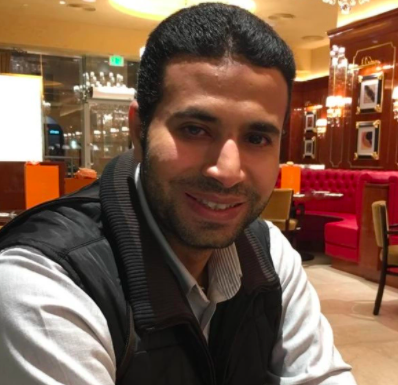Samira al-Taher, wife of the detained Egyptian journalist Hisham Abdel Aziz, spares no effort to confirm the deterioration of her husband’s health condition inside his prison cell in Tora Prison (south of Cairo) and that he is actually in danger of losing his eyesight.
However, no one in the Egyptian regime bothered to explain the reason Hisham has been imprisoned for two years without a court ruling. Samira published Hisham’s last letter to her, which aroused widespread sympathy.
Hisham’s wife wrote an influential tweet on Twitter: “How much is a prisoner’s message worth to his love? He wrote it eagerly and then concluded it: It may be my last letter, as my eyes no longer see the letters. “
Regarding the suffering of the family, the wife said in another tweet: “No one knows how the detainees’ children and wives live. After the detainee turns into a mere number on the waiting list for the ongoing renewal of pretrial detention sessions, they fluctuate in this world without knowing where the destination is. No law is useful.”
Commenting on the extent of the suffering of the journalist Hisham’s family, in light of his pretrial detention’s prolonged extension without trial, Mustafa Azab, the regional director of the Arab Organisation for Human Rights, said that Egypt is witnessing a severe politicisation of the judiciary. The pretrial detention, which is supposed to be a precautionary measure, has turned into a punishment. He added: “In the case of the journalist Hisham, in particular, his detention is tightened before judicial departments without ever being presented to them. He comes from his detention and is placed in a cell and does not go out to confront the judge, and then his detention is automatically renewed.” He continued, “Even if Hisham was serving a sentence in prison, the Egyptian authorities, according to the Prisons Organisation Law, should have ordered his release because he is already threatened with losing his eyesight.”
In turn, journalist Heba Zakaria said, “Hisham Abdel Aziz is a classmate and has worked for long periods of time, and the news of his arrest was shocking to us because Hisham is not known to have any political affiliations.” She added: “Despite all the problems and events in Egypt during the last ten years, Hisham was keen to visit his family every year, as he does not have any legal or political problem that prevents him from doing so.”
And she continued: “There is no justification for Hisham’s arrest other than that it was a kind of political intrigue in the context of the Gulf crisis. After reconciliation took place and the problem ended, there is no justification for his continued detention, and he should be released immediately, as happened with journalist Mahmoud Hussein.” She added: “What Hisham is suffering now goes beyond any punishment, even if he was convicted, so no one should be threatened with losing his eyesight.”
The Egyptian authorities renewed Hisham’s imprisonment days ago for 45 days, bringing his detention period to about 650 days. The signature campaign that activists launched to demand his release continues. Hisham was arrested in 2019 upon returning to a regular annual holiday in Egypt. The petition stated that Hisham has been detained for more than 600 days, despite the decision to release him pending Case No. 1365 of 2018 state security restriction, and that he suffers from glaucoma in both eyes and high pressure in the eye, which causes a darkening of the cornea and blurred vision. He needs urgent surgery so that he does not lose his sight. The petition explained that he also suffers from calcification in the stapes bone in the middle ear, which affects his ability to hear.
Tens of thousands of opponents of Abdel Fattah al-Sisi are in Egyptian prisons, in inhuman conditions of detention, and on charges of a political nature. Medical negligence in various prisons and detention centres was the main cause of death for at least 980 prisoners in various places of detention during the period between June 2014 and the first quarter of 2020; 2019 was the most painful year in the increase in numbers





Recent Comments